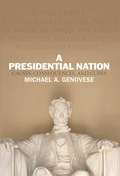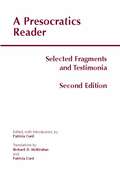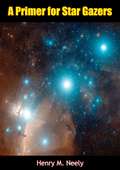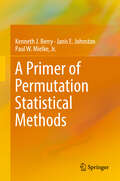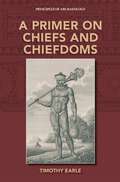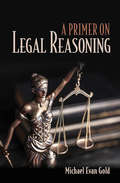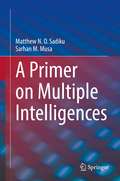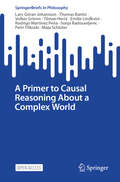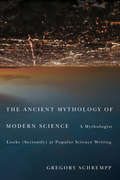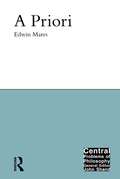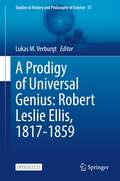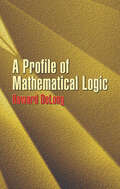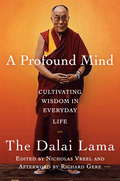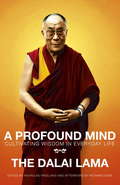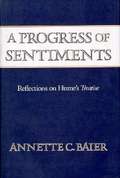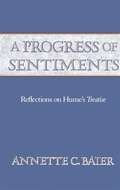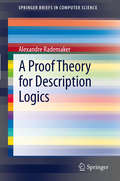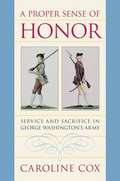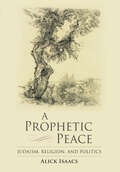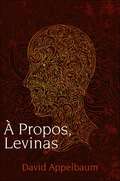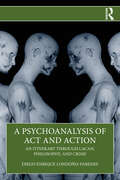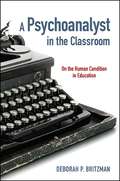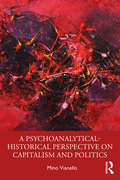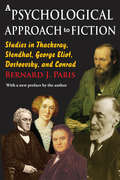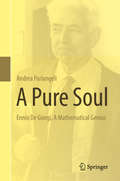- Table View
- List View
A Presidential Nation
by Michael A. GenoveseThe Washington Monument, the Lincoln Memorial, the Jefferson Memorial. Why do we devote monuments to the presidents? Why do we honor them, instead of Congress, or the courts? A Presidential Nation examines how the presidency--an office limited by the Constitution and separation of powers--became the centerpiece of American government. Michael A. Genovese argues that in rebelling against the British, the Framers of the Constitution invented a circumscribed presidency to guard against executive tyranny. Yet, over time, presidential power has risen and congressional power declined to a point where the United States has a near imperial presidency. Reexamining the status of presidential power in the post-9/11 world, Dr. Genovese considers the alternatives, if any, to the current model of presidential power. A Presidential Nation is perfect for students of American Presidency and Federal Governance courses and anyone interested in the changing authority of the American political system.
A Presocratics Reader: Selected Fragments and Testimonia
by Richard D. Mckirahan Patricia CurdBuilding on the virtues that made the first edition of A Presocratics Reader the most widely used sourcebook for the study of the Presocratics and Sophists, the second edition offers even more value and a wider selection of fragments from these philosophical predecessors and contemporaries of Socrates.With revised introductions, annotations, suggestions for further reading, and more, the second edition draws on the wealth of new scholarship published on these fascinating thinkers over the past decade or more, a remarkably rich period in Presocratic studies.At the volume's core, as ever, are the fragments themselves--but now in thoroughly revised and, in some cases, new translations by Richard D. McKirahan and Patricia Curd, among them those of the recently published Derveni Papyrus.
A Primer for Star Gazers
by Henry M. NeelyA beginner’s book on astronomy, which should enable anyone to locate the various constellations. Primer for Star Gazers explains in simple pictures and directions, with brief consideration to fixed stars, the northern sky and the planets. It includes a star calendar.“This book is an effort to rescue the ancient love of simple star-gazing from the avalanche of mathematics and physics under which modern astronomy threatens to bury it.”—Henry M. Neely“For the absolute amateur, who does not want too scientific a study but does want to be able to recognize the principal stars and constellations”—Kirkus Review
A Primer of Permutation Statistical Methods
by Kenneth J. Berry Janis E. Johnston Paul W. Mielke, Jr.The primary purpose of this textbook is to introduce the reader to a wide variety of elementary permutation statistical methods. Permutation methods are optimal for small data sets and non-random samples, and are free of distributional assumptions. The book follows the conventional structure of most introductory books on statistical methods, and features chapters on central tendency and variability, one-sample tests, two-sample tests, matched-pairs tests, one-way fully-randomized analysis of variance, one-way randomized-blocks analysis of variance, simple regression and correlation, and the analysis of contingency tables. In addition, it introduces and describes a comparatively new permutation-based, chance-corrected measure of effect size. Because permutation tests and measures are distribution-free, do not assume normality, and do not rely on squared deviations among sample values, they are currently being applied in a wide variety of disciplines. This book presents permutation alternatives to existing classical statistics, and is intended as a textbook for undergraduate statistics courses or graduate courses in the natural, social, and physical sciences, while assuming only an elementary grasp of statistics.
A Primer on Chiefs and Chiefdoms (Principles of Archaeology)
by Timothy EarleChiefs are political operatives who hold titles of leadership over groups larger than intimate kin-based communities. Although they rule with the consent of their group, they are all about building personal power and respect. Many scholars have viewed chiefs as problem solvers--defending groups against aggressors, resolving disputes, providing support under hardship, organizing labor for community projects, and redistributing goods among those in need. Chiefs do these things, but much of what chiefs do is accumulate benefits for themselves, staying in power and legitimizing control. Anthropological archaeology is well suited to pursue the study of chiefs, their leadership institutions (chiefdoms), and long-term historical processes. The author argues that studying chiefdoms is essential to understanding the role of elemental powers in social evolution. As an illustration, he studies chiefs and their power strategies in historically independent prehistoric and traditional societies and discusses how they continue to exist as powerful actors within modern states.
A Primer on Legal Reasoning
by Michael Evan GoldAfter years of teaching law courses to undergraduate, graduate, and law students, Michael Evan Gold has come to believe that the traditional way of teaching – analysis, explanation, and example – is superior to the Socratic Method for students at the outset of their studies.In courses taught Socratically, even the most gifted students can struggle, and many others are lost in a fog for months. Gold offers a meta approach to teaching legal reasoning, bringing the process of argumentation to the fore.Using examples both from the law and from daily life, Gold's book will help undergraduates and first-year law students to understand legal discourse. The book analyzes and illustrates the principles of legal reasoning, such as logical deduction, analogies and distinctions, and application of law to fact, and even solves the mystery of how to spot an issue.In Gold's experience, students who understand the principles of analytical thinking are able to understand arguments, to evaluate and reply to them, and ultimately to construct sound arguments of their own.
A Primer on Multiple Intelligences
by Sarhan M. Musa Matthew N. SadikuThis book provides an introduction to nineteen popular multiple intelligences. Part One discusses general intelligence, psychological testing, naturalistic intelligence, social intelligence, emotional intelligence, interpersonal intelligence, and cultural intelligence. Part Two tackles machine intelligence, the development of artificial intelligence, computational intelligence, and digital intelligence, or the ability for humans to adapt to a digital environment. Finally, Part Three discusses the role of intelligence in business development, using technology to augment intelligence, abstract thinking, swarm and animal intelligence, military intelligence, and musical intelligence. A Primer on Multiple Intelligences is a must-read for graduate students or scholars considering researching cognition, perception, motivation, and artificial intelligence. It will also be of use to those in social psychology, computer science, and pedagogy. It is as a valuable resource for anyone interested in learning more about the multifaceted study of intelligence.
A Primer to Causal Reasoning About a Complex World (SpringerBriefs in Philosophy)
by Volker Grimm Maja Schlüter Lars-Göran Johansson Petri Ylikoski Thomas Banitz Tilman Hertz Emilie Lindkvist Rodrigo Martínez Peña Sonja RadosavljevicThis open access book is about causal thinking and the use of causal language, with a focus on introducing philosophical ideas about causation to students and researchers of Social-Ecological Systems (SES). It takes a systematic approach to three central topics: the meanings of different causal expressions, sufficiency of evidence for inferences from observations to causal relations, and how to handle the complexity of causal relations in social-ecological systems. Consequently, the book is divided into three parts. In the first part the authors analyse and discuss the use of causal idiom in ordinary language, and in the second part they scrutinise the use of causal concepts and causal inference in science. Finally, the authors discuss causal reasoning about social-ecological systems in multi- and interdisciplinary contexts. This book provides an analysis of the concept of causation useful in the empirical sciences, where causal notions and idioms often are used without sufficient reflection. Empirical sciences often use causal idiom drawn from ordinary language, and similarly there is little formalisation of causal language and technical concepts in the humanities and social sciences. This book is a valuable resource for the application of current philosophical discussions about the concept of causation, in particular when applied to the analysis of social-ecological systems, but also when applied to research in the sciences and humanities.
A Priori: A Mythologist Looks (Seriously) at Popular Science Writing (Central Problems of Philosophy)
by Gregory SchremppHumans have long been captivated by mythology and theorized about the lessons embedded in their tales. In The Ancient Mythology of Modern Science, Gregory Schrempp brings a mythologist's critical eye to popular science writing, a flourishing genre that forms a key link between science and popular consciousness. Schrempp argues that the defining and appealing characteristic of this genre is not simplification or "dumbing-down," but the attempt to parlay scientific findings into aesthetically and morally compelling visions that offer guidance for humanity. Schrempp argues that in striving for inspirational visions, popular science invariably reproduces - with ingenious invention - the structures, strategies, and cosmic imagery that infuse traditional mythological views of the cosmos. His claim challenges the widespread tendency to separate myth and science. Schrempp considers both the intellectual history of mythography and concrete examples from world mythologies including ancient Greek, Oceanic, and Native American. Schrempp's explorations span a range of fields, including astronomy, evolutionary biology, and cognitive science. In a world informed, transformed, and sometimes mesmerized by science, this book offers the first in-depth study of popular science writing from a mythologist's perspective.
A Priori: A Mythologist Looks (seriously) At Popular Science Writing (Central Problems of Philosophy #19)
by Edwin MaresIn recent years many influential philosophers have advocated that philosophy is an a priori science. Yet very few epistemology textbooks discuss a priori knowledge at any length, focusing instead on empirical knowledge and empirical justification. As a priori knowledge has moved centre stage, the literature remains either too technical or too out of date to make up a reasonable component of an undergraduate course. Edwin Mares book aims to rectify this. This book seeks to make accessible to students the standard topics and current debates within a priori knowledge, including necessity and certainty, rationalism, empiricism and analyticity, Quine's attack on the a priori, Kantianism, Aristotelianism, mathematical knowledge, moral knowledge, logical knowledge and philosophical knowledge.
A Prodigy of Universal Genius: Robert Leslie Ellis, 1817-1859 (Studies in History and Philosophy of Science #55)
by Lukas M. VerburgtThis open access book brings together for the first time all aspects of the tragic life and fascinating work of the polymath Robert Leslie Ellis (1817–1859), placing him at the heart of early-Victorian intellectual culture. Written by a diverse team of experts, the chapters in the book’s first part contain in-depth examinations of, among other things, Ellis’s family, education, Bacon scholarship and mathematical contributions. The second part consists of annotated transcriptions of a selection of Ellis’s diaries and correspondence. Taken together, A Prodigy of Universal Genius: Robert Leslie Ellis, 1817–1859 is a rich resource for historians of science, historians of mathematics and Victorian scholars alike. Robert Leslie Ellis was one of the most intriguing and wide-ranging intellectual figures of early Victorian Britain, his contributions ranging from advanced mathematical analysis to profound commentaries on philosophy and classics and a decisive role in the orientation of mid-nineteenth century scholarship. This very welcome collection offers both new and authoritative commentaries on the work, setting it in the context of the mathematical, philosophical and cultural milieux of the period, together with fascinating passages from the wealth of unpublished papers Ellis composed during his brief and brilliant career.- Simon Schaffer, Department of History and Philosophy of Science, University of Cambridge
A Profile of Mathematical Logic
by Howard DelongAnyone seeking a readable and relatively brief guide to logic can do no better than this classic introduction. A treat for both the intellect and the imagination, it profiles the development of logic from ancient to modern times and compellingly examines the nature of logic and its philosophical implications. No prior knowledge of logic is necessary; readers need only an acquaintance with high school mathematics. The author emphasizes understanding, rather than technique, and focuses on such topics as the historical reasons for the formation of Aristotelian logic, the rise of mathematical logic after more than 2,000 years of traditional logic, the nature of the formal axiomatic method and the reasons for its use, and the main results of metatheory and their philosophic import. The treatment of the Gödel metatheorems is especially detailed and clear, and answers to the problems appear at the end.
A Profound Mind
by Nicholas Vreeland Richard Gere H. H. the Dalai LamaFor the first time for general readers, the Dalai Lama presents a comprehensive overview of the most important teaching of Buddhism. Perhaps the main difference between Buddhism and other religions is its understanding of our core identity. The existence of the soul or self, which is central in different ways to Hinduism, Judaism, Christianity, and Islam, is actually denied in Buddhism. Even further, belief in a "self" is seen as the main source of our difficulties in life. Yet a true understanding of this teaching does not lead one to a despairing, cynical worldview with a sense that life has no meaning--Far from it, a genuine understanding leads to authentic happiness for an individual and the greatest source of compassion for others. In 2003 and in 2007, the Dalai Lama was invited to New York to give a series of talks on the essential Buddhist view of selflessness. This new book, the result of those talks, is now offered to help broaden awareness of this essential doctrine and its usefulness in living a more meaningful and happy life. While the Dalai Lama offers a full presentation of his teachings on these key philosophical points for contemplation, he also shows readers how to bring these teachings actively into their own lives with recommendations for a personal practice. It is only by actually living these teachings that we allow them to bring about a genuine transformation in our perception of ourselves and our lives A Profound Mind offers important wisdom for those committed to bringing about change in the world through developing their own spiritual capabilities, whether they are Buddhists or not.From the Hardcover edition.
A Profound Mind: Cultivating Wisdom in Everyday Life
by Dalai Lama The Dalai LamaThe Dalai Lama visited New York in 2003 and gave a series of lectures, culminating with a public talk in Central Park, which drew over a quarter of a million people. Based on these lectures, this new volume will provide practical instruction on how we can use meditation to realise the mind's phenomenal potential. It will also lead the reader through the diverse schools of Buddhist philosophy, teaching us how to let go of our own strong ideas of self and how to find a little more happiness in life, for ourselves and for others. For all the millions of fans of the Dalai Lama's writings, and for anyone yet to be introduced to his thinking, Training the Mind is the perfect book to learn how to dedicate our positive activities to the benefit of all in order to build a better world.
A Progress of Sentiments: Reflections on Hume's Treatise
by Annette C. BaierAnnette Baier’s aim is to make sense of David Hume’s Treatise as a whole. Hume’s family motto, which appears on his bookplate, was “True to the End.” Baier argues that it is not until the end of the Treatise that we get his full story about “truth and falsehood, reason and folly.” By the end, we can see the cause to which Hume has been true throughout the work. <p><p> Baier finds Hume’s Treatise on Human Nature to be a carefully crafted literary and philosophical work which itself displays a philosophical progress of sentiments. His starting place is an overly abstract intellectualism that deliberately thrusts passions and social concerns into the background. In the three interrelated books of the Treatise, his “self-understander” proceeds through partial successes and dramatic failures to emerge with new-found optimism, expecting that the “exact knowledge” the morally self-conscious anatomist of human nature can acquire will itself improve and correct our vision of morality. Baier describes how, by turning philosophy toward human nature instead of toward God and the universe, Hume initiated a new philosophy, a broader discipline of reflection that can embrace Charles Darwin and Michel Foucault as well as William James and Sigmund Freud. Hume belongs both to our present and to our past.
A Progress of Sentiments: Reflections on Hume’s <i>Treatise</i> (Emersion: Emergent Village Resources For Communities Of Faith Ser.)
by Annette C. BaierAnnette Baier’s aim is to make sense of David Hume’s Treatise as a whole. Hume’s family motto, which appears on his bookplate, was “True to the End.” Baier argues that it is not until the end of the Treatise that we get his full story about “truth and falsehood, reason and folly.” By the end, we can see the cause to which Hume has been true throughout the work.Baier finds Hume’s Treatise on Human Nature to be a carefully crafted literary and philosophical work which itself displays a philosophical progress of sentiments. His starting place is an overly abstract intellectualism that deliberately thrusts passions and social concerns into the background. In the three interrelated books of the Treatise, his “self-understander” proceeds through partial successes and dramatic failures to emerge with new-found optimism, expecting that the “exact knowledge” the morally self-conscious anatomist of human nature can acquire will itself improve and correct our vision of morality. Baier describes how, by turning philosophy toward human nature instead of toward God and the universe, Hume initiated a new philosophy, a broader discipline of reflection that can embrace Charles Darwin and Michel Foucault as well as William James and Sigmund Freud. Hume belongs both to our present and to our past.
A Proof Theory for Description Logics (SpringerBriefs in Computer Science)
by Alexandre RademakerDescription Logics (DLs) is a family of formalisms used to represent knowledge of a domain. They are equipped with a formal logic-based semantics. Knowledge representation systems based on description logics provide various inference capabilities that deduce implicit knowledge from the explicitly represented knowledge. A Proof Theory for Description Logics introduces Sequent Calculi and Natural Deduction for some DLs (ALC, ALCQ). Cut-elimination and Normalization are proved for the calculi. The author argues that such systems can improve the extraction of computational content from DLs proofs for explanation purposes.
A Proper Sense of Honor: Service and Sacrifice in George Washington's Army
by Caroline CoxStarting with the decision by patriot leaders to create a corps of officers who were gentlemen and a body of soldiers who were not, Caroline Cox examines the great gap that existed in the conditions of service of soldiers and officers in the Continental army.
A Prophetic Peace: Judaism, Religion, and Politics
by Alick Isaacs“Real philosophy for the real world . . . if you’re interested in peace, read it.” —EborChallenging deeply held convictions about Judaism, Zionism, war, and peace, Alick Isaacs’s combat experience in the second Lebanon war provoked him to search for a way of reconciling the belligerence of religion with its messages of peace.In his insightful readings of the texts of Biblical prophecy and rabbinic law, Isaacs draws on the writings of Ludwig Wittgenstein, Jacques Derrida, Abraham Joshua Heschel, and Martin Buber, among others, to propose an ambitious vision of religiously inspired peace. Rejecting the notion of Jewish theology as partial to war and vengeance, this eloquent and moving work points to the ways in which Judaism can be a path to peace. A Prophetic Peace describes an educational project called Talking Peace whose aim is to bring individuals of different views together to share varying understandings of peace.
A Propos, Levinas
by David Appelbaum"Imagine listening at a keyhole to a conversation with the task of transcribing it, and the result may be a text similar to the present one." — from Part I: StageworkIn a series of meditations responding to writings by Emmanuel Levinas, David Appelbaum suggests that a flawed grammar warrants Levinas to speak of language at the service of ethics. It is the nature of performance that he mistakes. Appelbaum articulates this flaw by performing in writing the act of the philosophical mind at work. Incorporating the voices of other thinkers—in particular Levinas's contemporaries Jacques Derrida and Maurice Blanchot—sometimes clearly, sometimes indistinctly, Appelbaum creates on these pages a kind of soundstage upon which illustrations appear of what he terms "a rhetorical aesthetic," which would reestablish rhetoric, rules for giving voice—and not ethics—as the correct matrix for understanding the otherness and beyond-being that Levinas seeks in his work.
A Psychoanalysis of Act and Action: An Itinerary through Lacan, Philosophy, and Crime
by Diego Enrique Londoño-ParedesA Psychoanalysis of Act and Action brings together the study of the philosophy of action and Jacques Lacan’s psychoanalytic theory.Drawing on the works of Freud and Lacan, this book examines desire and the unconscious as key frameworks for understanding action. Londoño-Paredes explores key premises in the philosophy of action, while demonstrating how these may fall short in light of Lacan’s ideas. The book proposes an alternative to dominant philosophical interpretations, exploring Lacan’s framework through concepts such as the graph, the act, the transgressive act, acting out, and passage à l’acte. The paradoxes of action, along with forms of action that carry moral and symbolic weight are examined from a psychoanalytic perspective, helping us to understand the interpretive boundaries of action. By intertwining philosophical and psychoanalytic perspectives with clinical illustrations of real crimes, the book offers a fresh approach to action and act.A Psychoanalysis of Act and Action will be essential for psychoanalytically informed readers interested in Lacan. It will also be of interest to academics and scholars of the philosophy of mind and action, cultural studies, criminology, and mental disorders.
A Psychoanalyst in the Classroom: On the Human Condition in Education (SUNY series, Transforming Subjects: Psychoanalysis, Culture, and Studies in Education)
by Deborah P. BritzmanA Psychoanalyst in the Classroom provides rich descriptions of the surprising ways individuals handle matters of love and hate when dealing with reading and writing in the classroom. With wit and sharp observations, Deborah P. Britzman advocates for a generous recognition of the vulnerabilities, creativity, and responsibilities of university learning. Britzman develops themes that include the handling of technique in psychoanalysis and pedagogy, the uses of theory, regression to adolescence, the inner life of gender, the untold story of the writing block, and everyday mistakes in teaching and learning. She also examines the relationship between mental health and experiences of teaching and learning.
A Psychoanalytical-Historical Perspective on Capitalism and Politics
by Mino VianelloA Psychoanalytical-Historical Perspective on Capitalism and Politics explores how empathy once shaped the collective unconscious, before being replaced by rampant individualistic drive to power. Mino Vianello uses "radical federalism" to define a new approach to democracy, hoping for an end to the repetition of outdated political and economic ideals to solve the world’s democratic crisis. The book brings together a multitude of disciplines and perspectives, including Marxism, history, class, feminism, politics and empathy, to provide a comprehensive and honest history of power from the Enlightenment to the present day. This interdisciplinary study will be key reading for academics and scholars of Jungian studies, politics, sociology, history and economics.
A Psychological Approach to Fiction: Studies in Thackeray, Stendhal, George Eliot, Dostoevsky, and Conrad
by Bernard J. Paris"Psychology helps us to talk about what the novelist knows, but fiction helps us to know what the psychologist is talking about." So writes the author of this brilliant study. The chief impulse of realistic fiction is mimetic; novels of psychological realism call by their very nature for psychological analysis. This study uses psychology to analyze important characters and to explore the consciousness of the author and the work as a whole. What is needed for the interpretation of realistic fiction is a psychological theory congruent with the experience portrayed. Emerging from Paris' approach are wholly new and illuminating interpretations of Becky Sharp, William Dobbin, Amelia Sedley, Julien Sorel, Madame de Renal, Mathilde de la Mole, Maggie Tulliver, the underground man, Charley Marlow, and Lord Jim. The psychological approach employed by Paris helps the reader not only to grasp the intricacies of mimetic characterization, but also to make sense of thematic inconsistencies which occur in some of the books under consideration. For students of human behavior as well as students of literature, the great figures of realistic fiction provide a rich source of empathic understanding and psychological insight.
A Pure Soul: Ennio De Giorgi, A Mathematical Genius
by Andrea ParlangeliThis biography illuminates the life of Ennio De Giorgi, a mathematical genius in parallel with John Nash, the Nobel Prize Winner and protagonist of A Beautiful Mind. Beginning with his childhood and early years of research, into his solution of the 19th problem of Hilbert and his professorship, this book pushes beyond De Giorgi’s rich contributions to the mathematics community, to present his work in human rights, including involvement in the fight for Leonid Plyushch’s freedom and the defense of dissident Uruguayan mathematician José Luis Massera. Considered by many to be the greatest Italian analyst of the twentieth century, De Giorgi is described in this volume in full through documents and direct interviews with friends, family, colleagues, and former students.
